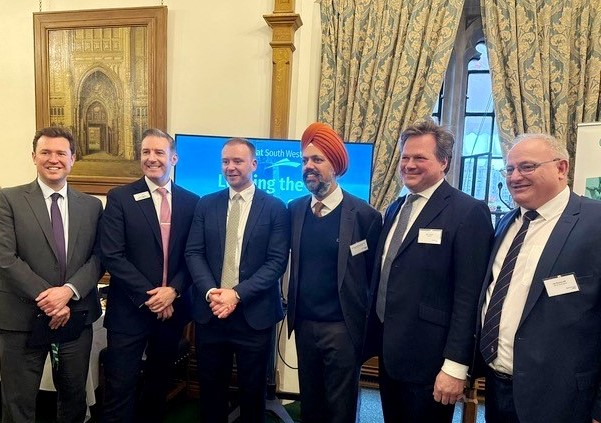Compass points the way towards decarbonisation

Above: Robin Mills, Carolyn Ball, Professor Sir Charles Godfray and Matt Scott.
Courtesy Compass Group
The plan draws on the largest food and drink carbon impact assessment undertaken and openly shared by any foodservice provider to date. The UK’s largest food and support services company has become the first in its sector to share a detailed transition plan aligned to the UK government’s Final Disclosure Framework following its recent release by the Transition Plan Taskforce (TPT). The Framework is intended to help companies develop and deliver ‘gold standard’ climate transition plans.
Compass Group reports an absolute reduction in emissions of -9.4% across Scope 1,2,3 (FY19 baseline – FY23). This has been achieved, inclusive of the company’s high organic growth, acquisitions and joint ventures. By including Compass’ growth within its analysis, an estimated -25% reduction in carbon intensity has been calculated.
Compass analysed a staggering 2.2 million rows of data, of which over 1.7 million accounts for food and beverage. The data analysis, which has been externally verified and achieved in collaboration with leading data scientists and food systems specialists, provides the business, its clients, peers and the wider economy with greater insights into the impact of the company’s operations.
Compass serves 214 million meals a year across 4,000 locations. Food and drink represents 62.5% of the caterer’s FY23 footprint, where the business has achieved a reduction of -162,828tCO2e of emissions attributed to food and drink purchases.
Examples of the impact achievable through Compass’ size, scale and agency are explained in the plan through four core levers of change: supply chain, operations, ingredients and culture.
Supply chain:
Compass’ procurement arm, Foodbuy is launching a new Net Zero Pipeline for FY24, where category buyers will assess the environmental implications of one product against another. Fifty potential carbon reduction initiatives have already been put forward in emissions intensive categories, e.g. beef and dairy.
Operations:
Strong sectorised leadership across 2,900+ partnerships is shown through specific interventions, data-driven action, and accountability. For example, in Levy UK + Ireland, Compass’ sports and leisure sector, 30% of all general managers’ bonuses are now linked to 124 site-level environmental KPIs and in its business and industry (B&I) sector, minimising the most carbon intensive dishes is now a KPI for chefs working across the business.
Ingredients:
Twenty-five per cent of 8,004 centrally analysed recipes (one in four) now have A and B rated footprints. These are a representative sample of its wider library of recipes, as part of Compass’ commitment to reformulate a centralised bank, that’s as closely aligned to 1.5C as possible. This work is part of its strategic partnership with UK sustainability tech company, Foodsteps.
Culture:
Successfully reducing the carbon footprint of its 12 top selling meals in Compass’ business and industry sector has strengthened the alignment of its climate and health strategies, achieving an average saving per portion of 1.39kg CO2e across 209,029 meals sold every year.
Commenting on Compass UK&I’s transition plan, Baroness Vere of Norbiton, Parliamentary Secretary, HM Treasury said: “Transition plans are a key tool for companies and investors to understand the risks and opportunities facing a company in greater depth and detail. I am delighted that Compass UK & I have drawn on the excellent work of the Transition Plan Taskforce to drive their own transition planning and look forward to more firms doing so.”
Professor Sir Charles Godfray, Chief Climate and Sustainability Advisor, Compass UK&I said: “I am confident Compass’ approach and resolve will have a measurable, positive impact on the business, its clients, the foodservice sector and the wider economy. I also believe that companies like Compass, that anticipate the need to become sustainable, have a more resilient business model that will benefit the financial bottom line as well as contributing to keeping the planet inhabitable.”
Robin Mills, Chief Executive Officer, Compass Group UK & Ireland added: “We always knew setting a 2030 target was ambitious but it has helped to accelerate change in our business and drive positive behaviours as we seek to operate more sustainablyin all that we do. It’s great to see that the actions we are taking are having an impact. At the
outset we said we wanted to be transparent and share our learnings. I am delighted to be publishing our transition plan, which I hope provides great learnings for others to also work with.”
Carolyn Ball, Director of Delivery for Net Zero, Compass Group UK & Ireland concluded: “Compass’ opportunity to contribute to society, the economy and the natural environment we depend on has motivated a growing and talented multi-disciplinary team. Over the coming years there will be developments we can’t foresee or accurately forecast. This means our plan will necessarily evolve over time. We sincerely thank everyone who continues to support us.”
Food and climate summit
Leaders from the UK Government, UN and businesses joined Compass Group UK & Ireland at its climate summit where the company launched its landmark Climate Transition Plan. The UK’s largest food and support services firm hosted 400 delegates from over 100 global and UK based companies for a candid discussion about the realities of transitioning to a low-carbon economy.
Keynote addresses assessed the domestic and global picture around climate transitioning, including economic opportunities and the realities of food systems change. Speeches were delivered by:
- Baroness Vere of Norbiton, Parliamentary Secretary at HM Treasury
- Myrto Arvantini, Head of Marketing and Communications at the UN’s Food and Agriculture Organisation (UNFAO)
- Saasha Celestial-One, Co-Founder and COO, Olio
- Professor Sir Charles Godfray, a leading academic on food and Compass UK&I
external climate advisor.
The summit covered a wide range of topics crucial for an economy-wide net zero transition. This included food sector challenges such as food waste, supply chains and sustainable dieting, as well as the importance of cross-sector partnerships and accountability across the business community.
Speaking at the event, Baroness Vere said: “I want you to think about where your business will be in 15-20 years and be as ambitious as you can with your climate commitments, especially considering what that will mean for your bottom line. Because others are and will. We want to ensure that the standards are in place so that businesses can deliver on the promises that we make to all our stakeholders, and the TPT Disclosure Framework is a strong basis for what that should look like. I hope that everyone publishes a detailed transition plan and congratulations to Compass Group for taking a lead on this important matter.”
Matt Scott, Co-Chair of the UK’s Transition Plan Taskforce Disclosure Framework and Executive Director, UK Centre for Greening Finance & Investment, said: “Transition plans are moving from niche to mainstream and becoming core to business strategy. By taking a strategic and rounded approach, aligned with the recommendations of the UK’s Transition Plan Taskforce, Compass are leading the way. Many congratulations to the team – not only for taking such an impressive next step on their transition planning journey but also for inspiring action across the UK food sector through today’s launch event – it’s been a real pleasure and privilege to take part.”














